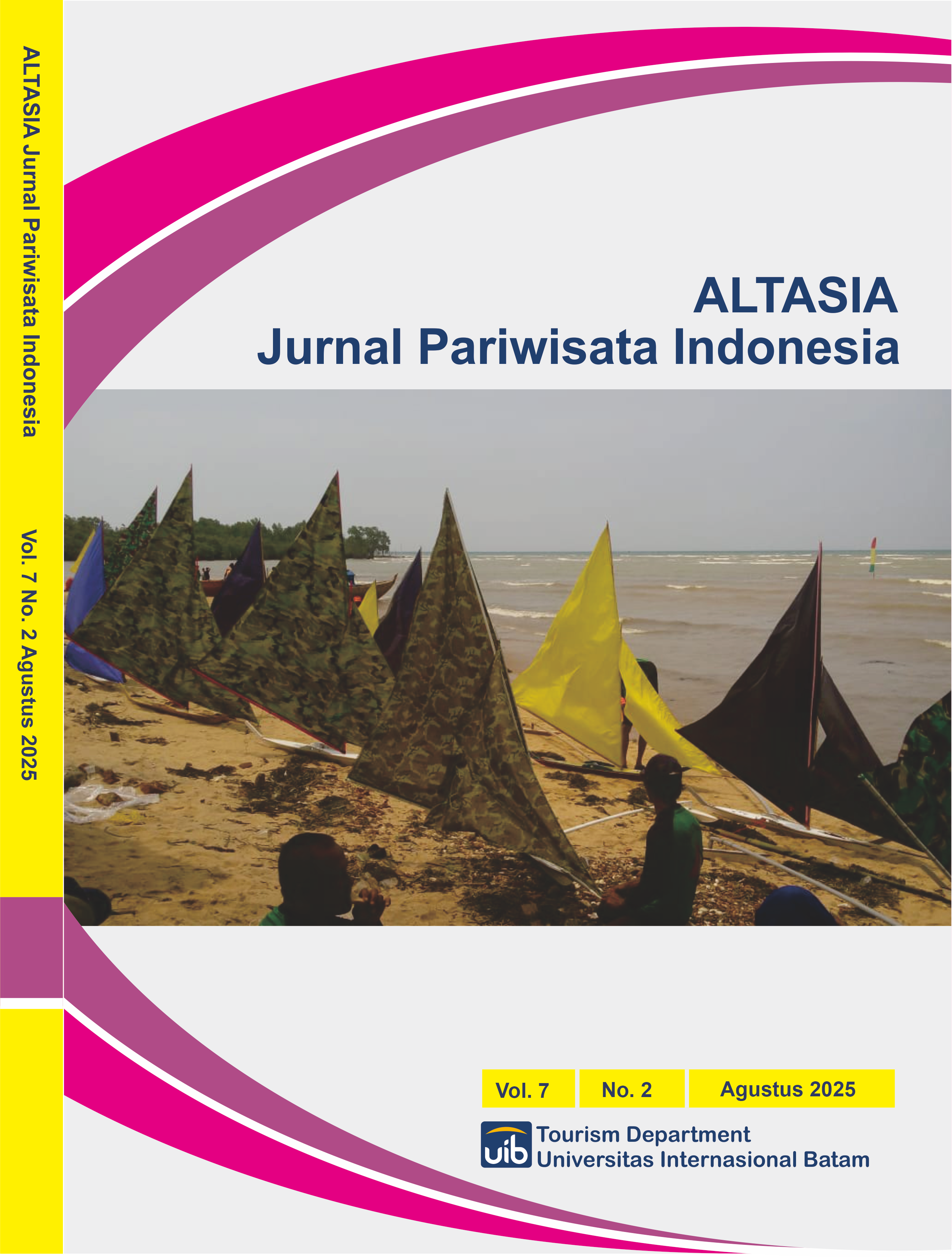Pengaruh Kesadaran Konservasi terhadap Partisipasi Masyarakat di Ekowisata Kebun Raya Kuningan
DOI:
https://doi.org/10.37253/altasia.v7i2.10670Keywords:
kesadaran konservasi, partisipasi ekowisata, stimulus–organisme–respons, perilaku pro-lingkungan, Kebun Raya KuninganAbstract
Meningkatnya ancaman terhadap kelestarian lingkungan menuntut pendekatan konservasi yang melibatkan masyarakat, salah satunya melalui ekowisata. Namun, masih minim riset yang secara spesifik meninjau bagaimana kesadaran konservasi pengunjung berdampak terhadap partisipasi konservatif mereka, khususnya di destinasi dataran tinggi seperti Kebun Raya Kuningan (KRK). Penelitian ini bertujuan untuk menganalisis pengaruh kesadaran konservasi lingkungan terhadap partisipasi pengunjung dalam aktivitas ekowisata di KRK. Menggunakan pendekatan kuantitatif dengan jenis penelitian asosiatif kausal, teknik analisis regresi linier sederhana diaplikasikan pada data dari 100 responden yang diperoleh melalui accidental sampling. Hasil penelitian menunjukkan bahwa kesadaran konservasi berpengaruh positif dan signifikan terhadap partisipasi konservatif pengunjung (p = 0,006), dengan nilai koefisien regresi 0,344. Namun demikian, koefisien determinasi sebesar 0,068 menunjukkan bahwa hanya 6,8% variasi partisipasi yang dapat dijelaskan oleh kesadaran konservasi, mengindikasikan peran signifikan faktor lain. Dimensi afektif dan konatif terbukti lebih dominan dibanding dimensi kognitif. Penelitian ini menyimpulkan bahwa strategi penguatan partisipasi perlu diarahkan pada pendekatan edukatif berbasis pengalaman yang menyentuh sisi emosional dan niat bertindak. Keterbatasan studi ini terletak pada model regresi yang belum memasukkan variabel eksternal lain seperti norma sosial dan motivasi kunjungan. Rekomendasi diberikan kepada pengelola destinasi untuk mengembangkan program edukatif partisipatif dan strategi segmentasi pengunjung berbasis nilai konservatif.
Downloads
References
Afifah, K. N., Yoo, R., & Suhirman, S. (2024). Fostering Environmental Stewardship through Mangrove Ecotourism: A Study on Gili Sulat’s Educational Impact. International Journal of Ethnoscience and Technology in Education, 1(1), 55–75. https://doi.org/10.33394/ijete.v1i1.10882
Apriana, A., & Kusumah, A. H. G. (2025). Pengaruh Persepsi Kualitas Daya Tarik Wisata dan Kepuasan Wisatawan Terhadap Word of Mouth di Tanah Lot. Altasia Jurnal Pariwisata Indonesia, 7(1), 94–106. https://doi.org/10.37253/altasia.v7i1.10090
Asyraff, M. A., Hanafiah, M. H., Aminuddin, N., & Mahdzar, M. (2023). Adoption of the Stimulus–Organism–Response (S-O-R) Model in Hospitality and Tourism Research: Systematic Literature Review and Future Research Directions. Asia-Pacific Journal of Innovation in Hospitality and Tourism, 12(1), 19–48.
Cossengue, P. R., & Brea, J. F. (2025). The Transformative Power of Ecotourism : A Comprehensive Review of Its Economic, Social, and Environmental Impacts. Land, 14(1531), 1–25.
Galih, firnas D., Susanto, B., & Farida. (2022). Pengaruh Corporate Social Responsibility dan Likuiditas terhadap Kinerja Keuangan Perusahaan yang Memperoleh Suistainability Reporting Award (Studi Empiris pada Perusahaan Manufaktur yang terdaftar di ASRRAT dan SRA Tahun 2015-2020). Business and Economics Conference in the Utilization of Modern Technology, 885–905. https://journal.unimma.ac.id/index.php/conference/article/view/7501
Ginting, N., Munazirah, & Wahid, J. (2023). Community Participation in Sustainable Tourism: A Case Study in Balige, Indonesia. Environment-Behaviour Proceedings Journal, 8(23), 239–246. https://doi.org/10.21834/ebpj.v8i23.4509
Hochreiter, V., Benedetto, C., & Loesch, M. (2023). The Stimulus-Organism-Response (S-O-R) Paradigm as a Guiding Principle in Environmental Psychology: Comparison of its Usage in Consumer Behavior and Organizational Culture and Leadership Theory. Journal of Entrepreneurship and Business Development, 3(1), 7–16. https://doi.org/10.18775/jebd.31.5001
Hoffmann, R., Kanitsar, G., & Seifert, M. (2024). Behavioral barriers impede pro-environmental decision-making: Experimental evidence from incentivized laboratory and vignette studies. Ecological Economics, 225(November 2023), 108347. https://doi.org/10.1016/j.ecolecon.2024.108347
Jiang, S., Zhang, Z., Xu, H., & Pan, Y. (2024). What Influences Users’ Continuous Behavioral Intention in Cultural Heritage Virtual Tourism: Integrating Experience Economy Theory and Stimulus–Organism–Response (SOR) Model. Sustainability (Switzerland), 16(23), 1–29. https://doi.org/10.3390/su162310231
Khoirudin, R., & Silviariza, W. Y. (2025). Menghidupkan Warisan Budaya: Pentas Kesenian Sebagai Magnet Wisata Candi Surowono di KedirI. Altasia Jurnal Pariwisata Indonesia, 7(1), 80–93. https://doi.org/10.37253/altasia.v7i1.10054
Moscardo, G., & Hughes, K. (2023). Rethinking Interpretation to Support Sustainable Tourist Experiences in Protected Natural Areas. Journal of Interpretation Research, 28(1), 76–94. https://doi.org/10.1177/10925872231158988
Mota, L., Franco, M., & Santos, R. (2021). Island tourism carrying capacity in the UNESCO Site Laurisilva of Madeira. Island Studies Journal, 16(2), 255–269. https://doi.org/10.24043/ISJ.143
Nian, S., Li, D., Zhang, J., Lu, S., & Zhang, X. (2023). Stimulus-Organism-Response Framework: Is the Perceived Outstanding Universal Value Attractiveness of Tourists Beneficial to World Heritage Site Conservation? International Journal of Environmental Research and Public Health, 20(2), 1–21. https://doi.org/10.3390/ijerph20021189
Nurhasanah, I. S., Hudalah, D., & Van den Broeck, P. (2024). Systematic Literature Review on Alternative Governance Arrangements for Resource Deficient Situations: Small Island Community-Based Ecotourism. Island Studies Journal, 19(2), 214–237. https://doi.org/10.24043/001c.85173
Patilaiya, H. La, Probandari, A. N., Hartono, & Sunarto. (2024). Intervention Model to Improve Community Knowledge, Attitudes, and Behavior on Ecotourism Accessibility for People with Disabilities Knowledge, Attitudes, and Behavior on Ecotourism. Preprints. https://doi.org/10.20944/preprints202409.2153.v3
Prawira, M. F. A., Ramadhani, I., Audita, V. N., Andrianto, R., & Prawira, A. B. A. (2024). Pro-Environmental Behaviour in Tourism: A Systematic Literature Review and Future Research Directions. Journal of Tourism Sustainability, 4(2), 101–114. https://doi.org/10.35313/jtospolban.v4i2.137
Rahardjo, P., & Nuzzela, S. (2021). STUDIES OF COMMUNITY PARTICIPATION IN ECOTOURISM OF SMALL ISLAND IN INDONESIA (Pramuka Island in Jakarta City). Journal of Tourism & Sports Management (JTSM, 4(1), 782–795. https://jakarta.go.id/artikel/konten/3917/pulau-pramuka
Rahmadi Sitompul, Kaniwa Berliani, & Stanislav Lhota. (2024). Conflict Mitigation Practices and Conservation Awareness of Orangutans: A Case Study from Tangkahan Ecotourism, Leuser Ecosystem, Indonesia. International Journal of Ecophysiology, 6(1), 31–40. https://doi.org/10.32734/ijoep.v6i1.14274
Rahmanda, V. M., Indriani, S., & Sari, M. W. (2024). Edukasi Wisatawan Tentang Konservasi Ekowisata Alam : Membangun Kepedulian Wisatawan Terhadap Keanekaragaman Hayati Lokal. Jurnal Pengabdian Masyarakat Bangsa, 2(5), 1592–1596. https://doi.org/10.59837/jpmba.v2i5.1072
Sanjaya, D., Arief, M., Juli Setiadi, N., & Heriyati, P. (2024). Exploring the role of digital green marketing campaigns and environmental beliefs in shaping tourist behavior and revisit intentions in eco-tourism. Journal of Eastern European and Central Asian Research (JEECAR), 11(3), 553–572. https://doi.org/10.15549/jeecar.v11i3.1693
Siregar, O. M., Selwendri, S., & Nasution, M. D. T. P. (2024). Visitor Preferences on Ecotourism Attributes : A Study on Indonesian Visitor Preferences on Ecotourism Attributes : A Study on Indonesian Ecotourism Destinations. Journal of Management World, 4(December), 393–401. https://doi.org/10.53935/jomw.v2024i4.402
Sugiyono. (2020). Metodologi Penelitian Kuantitatif, Kualitatif dan R & D.
Tang, H., Ma, Y., & Ren, J. (2022). Influencing factors and mechanism of tourists’ pro-environmental behavior – Empirical analysis of the CAC-MOA integration model. Frontiers in Psychology, 13(November), 1–18. https://doi.org/10.3389/fpsyg.2022.1060404
Tian, H., & Liu, X. (2022). Pro-Environmental Behavior Research: Theoretical Progress and Future Directions. International Journal of Environmental Research and Public Health, 19(11). https://doi.org/10.3390/ijerph19116721
Triyuni, N. N., Puspita, N. P. L. A., Miranti, P. G. S., Sukmawati, N. M. R., & Anggana, I. P. S. (2024). Pro-Environmental Behavior in Munduk Ecotourism Village Buleleng (Vol. 2024). Atlantis Press International BV. https://doi.org/10.2991/978-94-6463-622-2_71
Wang, L., Yu, H., & Zhou, B. (2025). Formation mechanism of tourists’ pro-environmental behavior in plateau ecotourism destination. Humanities and Social Sciences Communications, 12(1), 1–14. https://doi.org/10.1057/s41599-025-04384-z
Wungo, G. L., Mussadun, & Ma’rif, S. (2020). Edukasi Penerapan Konsep Ecotourism di Kepulauan Karimunjawa. Jurnal Pasopati, 2(3), 142–149.
Yunus, M. (2024). A critical review of peatland ecosystem services research in Indonesia: Uncovering knowledge gaps and research needs. Journal of the Bulgarian Geographical Society, 50, 169–190. https://doi.org/10.3897/jbgs.e117635
Zhang, J., Jin, L., Pan, X., & Wang, Y. (2024). Pro-Environmental Behavior of Tourists in Ecotourism Scenic Spots: The Promoting Role of Tourist Experience Quality in Place Attachment. Sustainability (Switzerland), 16(20), 1–22. https://doi.org/10.3390/su16208984
Downloads
Published
Issue
Section
License
Copyright (c) 2025 Altasia Jurnal Pariwisata Indonesia

This work is licensed under a Creative Commons Attribution-NonCommercial 4.0 International License.
The article publication is wholly owned by the Indonesian Tourism Journal (ALTASIA).






.png)





